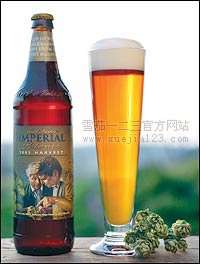Samuel Adams Imperial Pilsner 2005 Harvest

But beer parties are nothing new to Koch, nor are mid-morning meetings the following day, and after praising the merits of beer as part of a balanced breakfast, you can tell he's excited and eager to talk and taste beer. His latest beer: the Samuel Adams Imperial Pilsner.
"It was brewed as a showcase for hops," he says, producing several clear cookie jars full of the perennial botanical that hops farmers and beer geeks know ashumulus lupulus. The contents in each jar resemble marijuana -- cannabis sativa is a close cousin of humulus lupulus -- but their usage is hard to confuse. Beer hops look like miniature pinecones with layers of scales that are green and leafy. Each bud of hops contains lupulin, a resinous yellow substance, which, when used in brewing, gives beer its bitter flavor, as well as natural preservative qualities.
Koch empties the contents of the jars -- Noble Bavarian hops of the Hallertau Mittelfruh variety from the 2005 harvest -- onto the table. "Hops are to beer what grapes are to wine," he offers, and to truly understand beer and its flavors, one must first understand the ingredients and their roles in the beer-making process. That means understanding hops and -- Koch cannot stress it enough -- quality hops selection.
For the last 20 years, Koch has traveled to Germany to hand-select the hops he uses in his beers. Selection begins after the hops are harvested and the cones are dried in a hop house to reduce their 85 percent water content. Farmers then bring the hops to a hops dealer -- Joh. Barth & Sohn Inc. has a five-year contract with Boston Beer -- which then brings them to Koch.
As if he's back in Bavaria, Koch begins sifting through the hops that are on the table as though he's sorting through pieces of a jigsaw puzzle. This is the visual inspection, which Koch says "is not a beauty contest." Ultimately, he's after lupulin, while avoiding stems, broken cones, and windburned or overdried leaves, which will affect the quality of the yellow resins and oils.
The second part of the inspection is the rub. Koch scoops two handfuls of hops and begins rubbing them vigorously together in his palms, sending hops everywhere. Rubbing the hops together releases the aromatic qualities of the lupulin. Koch explains that he's interested in the quality of the aroma and the quantity of the aroma. After a few seconds of rubbing, he buries his nose into his handful of hops and inhales deeply. The blast of aroma is heavy with floral and herbal notes, spice, citrus and pine.
Since Koch first began brewing Sam Adams in 1984, he has always taken this hands-on approach to hops selection, which guarantees only the highest quality hops are being used. This translates to beer with smooth, complex flavor profiles and, depending on how much hops is used in the brewing process, an intense hoppy aroma and taste.
Of the Imperial Pilsner, Koch says, "I wanted to explore the limits of hops. And with good hops you can use reckless amounts and the beer will still taste good. It will be big and rich, but balanced."
Indeed, the Imperial Pilsner achieves what Koch set out to do. Koch used 12 pounds of hops per barrel of the Imperial Pilsner -- about 100 times the hops rate of domestic beers -- and the finished product boasts a whopping 110 International Bitterness Units (IBU). (The IBU scale is a scientific formula for measuring hops bitterness in finished beer. Light beer can be as low as 5 IBU, while an Irish stout, such as Guinness, is usually between 45 to 60 IBU.) The results are excellent. The beer is rich and robust, but refreshingly balanced, with many of the same flavor characteristics we found during the hops test: floral and spicy notes, with lots of tangerine, grapefruit and citrus, plus pine and a pleasant hoppy bitterness. The finish is long and tempts the drinker to further sate his palate.
"The Imperial Pilsner is for better beer drinkers who want hops," Koch says. "It is for better beer drinkers who want a different beer experience where they are expanding their palates."
The Samuel Adams Imperial Pilsner Harvest 2005 is available in 22-ounce bottles for $4.99. Between 50,000 and 60,000 bottles are being produced, which may make it difficult to find, but worth the effort.
上一篇:没有了

扫描微信,2014世界排名雪茄排名即将开启!
- 如何辨别假雪茄?
